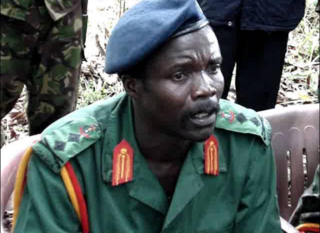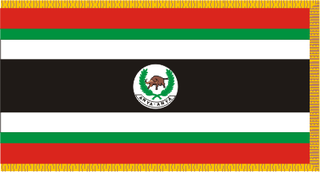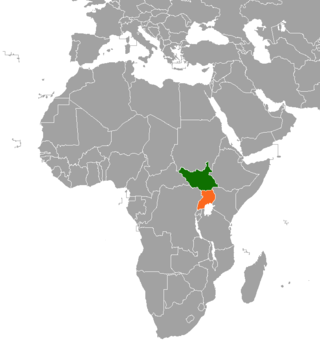
Idi Amin Dada Oumee was a Ugandan military officer and politician who served as the third president of Uganda from 1971 to 1979. He ruled as a military dictator and is considered one of the most brutal despots in modern world history.

Apollo Milton Obote was a Ugandan politician who served as the second prime minister of Uganda from 1962 to 1966 and the second president of Uganda from 1966 to 1971 and later from 1980 to 1985.

The Luo, are several ethnically and linguistically related Nilotic ethnic groups that inhabit an area ranging from Egypt and Sudan to South Sudan and Ethiopia, through Northern Uganda and eastern Congo (DRC), into western Kenya, and the Mara Region of Tanzania. Their Luo languages belong to the western branch of the Nilotic language family.

The Lord's Resistance Army insurgency is a conflict involving the Lord's Resistance Army against the government of Uganda. Following the Ugandan Civil War, militant Joseph Kony formed the Lord's Resistance Army and launched an insurgency against the newly installed President Yoweri Museveni. The stated goal was to establish a Christian state based on the Ten Commandments. Currently, there is low-level LRA activity in eastern areas of the Democratic Republic of the Congo and the Central African Republic. Kony proclaims himself the 'spokesperson' of God and a spirit medium.

Joseph Rao Kony is a Ugandan militant and warlord who founded the Lord's Resistance Army (LRA), designated as a terrorist group by the United Nations Peacekeepers, the European Union, and various other governments.

Dr. John Garang de Mabior was a Sudanese politician and revolutionary leader. From 1983 to 2005, he led the Sudan People's Liberation Army/Movement as a commander in chief during the Second Sudanese Civil War. He briefly served as First Vice President of Sudan for three weeks, from the comprehensive peace agreement of 2005 until his death in a helicopter crash on July 30, 2005. A developmental economist by profession, Garang was one of the major influence on the movement that led to the foundation of South Sudan independence from the rule of the government of Omar Bashir the former president of Sudan (Khartoum).

The East African Community (EAC) is an intergovernmental organisation composed of eight countries in East Africa. The member states are the Democratic Republic of the Congo, the Federal Republic of Somalia, the Republics of Burundi, Kenya, Rwanda, South Sudan, Uganda and Tanzania. Salva Kiir Mayardit, the president of South Sudan, is the current EAC chairman. The organisation was founded in 1967, collapsed in 1977, and was revived on 7th July 2000. The main objective of the EAC was to foster regional economic integration.

Juma Abdalla Oris was a Ugandan military officer and government minister under the dictatorship of Idi Amin. After fleeing his country during the Uganda–Tanzania War, he became leader of the West Nile Bank Front (WNBF), a rebel group active in the West Nile region of Uganda during the 1990s.

The Anyanya were a southern Sudanese separatist rebel army formed during the First Sudanese Civil War (1955–1972). A separate movement that rose during the Second Sudanese Civil War were, in turn, called Anyanya II. Anyanya means "snake venom" in the Ma'di language.

The politics of South Sudan concern the system of government in the Republic of South Sudan, a country in East Africa, and the people, organizations, and events involved in it.
The 1971 Ugandan coup d'état was a military coup d'état executed by the Ugandan military, led by general Idi Amin, against the government of President Milton Obote on 25 January 1971. The seizure of power took place while Obote was abroad attending the Commonwealth Heads of Government Meeting in Singapore. Amin was afraid that Obote might dismiss him, and installed himself as dictator.

Kiruhura District is a district in the Western Region of Uganda. The town of Rushere is the site of the district headquarters.
Mustafa Adrisi Abataki was a Ugandan military officer who served as the third vice president of Uganda from 1977 to 1979 and was one of President Idi Amin's closest associates. In 1978, after Adrisi was injured in a suspicious auto accident, troops loyal to him mutinied. Amin sent troops against the mutineers, some of whom had fled across the Tanzanian border, possibly contributing to the Uganda–Tanzania War. As the Ugandan war effort collapsed, Adrisi fled to Sudan where he claimed to retain the post of Vice President. He became briefly involved in the rebel activities of the Uganda National Rescue Front before returning from exile in 1987. He struggled with health problems in his later life and died in 2013.
Jimmy Lemi Milla was a Sudanese politician, and Cabinet member in Southern Sudan. He was a Pojulu.

South Sudan and Uganda are neighboring states with strong cultural economic and political ties. The South Sudan and the neighbouring state of Uganda enjoy relatively strong cultural, political, and economic ties. As South Sudan neared independence, both states begun to take advantage of increased opportunities for trade, development and educational exchanges. The rebel group Lord's Resistance Army (LRA), however, continues to operate in the border areas between South Sudan, the Democratic Republic of Congo and Uganda.

The South Sudanese Civil War was a multi-sided civil war in South Sudan between forces of the government and opposition forces. In December 2013, President Salva Kiir accused his former deputy Riek Machar and 10 others of attempting a coup d'état. Machar denied trying to start a coup and fled to lead the Sudan People's Liberation Movement-in-Opposition (SPLM-IO). Fighting broke out between the Sudan People's Liberation Movement (SPLM) and SPLM-IO, igniting the civil war. Ugandan troops were deployed to fight alongside the South Sudanese government. The United Nations has peacekeepers in the country as part of the United Nations Mission in South Sudan (UNMISS).
The following lists events that happened during 2006 in Sudan.

The Acholi people are a Nilotic ethnic group of Luo peoples, found in Magwi County in South Sudan and Northern Uganda, including the districts of Agago, Amuru, Gulu, Kitgum, Nwoya, Lamwo, Pader and Omoro District. The Acholi were estimated to number 2.3 million people and over 45,000 more were living in South Sudan in 2000.













